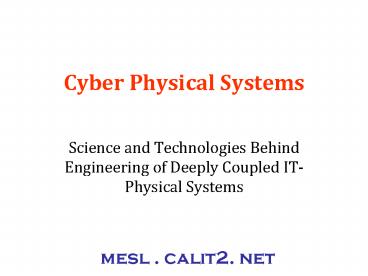Cyber Physical Systems - PowerPoint PPT Presentation
1 / 25
Title: Cyber Physical Systems
1
Cyber Physical Systems
- Science and Technologies Behind Engineering of
Deeply Coupled IT-Physical Systems
mesl . calit2. net
2
Executive office tasked with directing national
RD priority across all areas of ST.
http//www.nitrd.gov/pcast/reports/PCAST-NIT-FINAL
3
1 Priority
4
CPS Engineered Systems Embedded in Societal
Context
- Electronics, Networking and IT continue to
improve productivity and marketplace growth - However, their impact on societal infrastructure
is yet to be seen - Intelligent transportation networks
- Power distribution and delivery
- Healthcare
- Emergency response
- Challenges
- Highly distributed, complex systems of systems
- Societal integration challenges legacy,
scalability, policy goals - Goal
- Combat fragility, devise robust and adaptable
solutions to societal applications.
5
New Generation of Systems
- Airplanes and automobiles that are
environmentally friendly and energy efficient - Integrated, self optimizing transportation
systems and vehicles that interface with them - Advanced healthcare via increased automation,
integrating smart devices and providing safe
access to electronic medical records - New biotechnology via engineering closed-loop
biological systems
6
(No Transcript)
7
Monitoring Civil Infrastructure
Instrument large-scale structures for continuous
monitoring of structural health
8
Structural Health Monitoring
9
Sensing Strain/Active Probing
6 degrees of freedom (u, w, q ) linearly related
to applied loads and stiffness matrix.
10
From sensor elements to full system model
- Observations x of the state vector u can now be
made with a sensor network that obeys an
observability function L, x L(u) - Strain gauzes and accelerometers provide x
- Time evolution of state from Navier eqn
- M is a generalized inertial property (mass)
matrix, - K is a generalized elastic property (stiffness)
matrix, F represents all the applied loads
11
Structural Engineering Hits Scalability Issues
- From measurements x reconstruct the state space u
- Sampling built upon embedding theorems
- If an observable x(n) is recorded at discrete
intervals T, the resulting full state space
attractor may be retained by a time-delay
embedding
12
So we sample in time and space
Our research focused on determination of T and m.
13
An Active Sensing Platform for Wireless
Structural Health Monitoring
A pair of PZTs actuator sensor
Sponsored by LANL In collaboration with Uof
Bologna
Prof. Tajana Šimunic Rosing
14
Analyzing Deeply Coupled Systems
15
(No Transcript)
16
Structural Health Monitoring
- Goal Monitoring Technologies for Large Scale
Structures through sensing, computational
modeling and predictive analysis - Field prototypes
- Instrument large scale structures for continuous
monitoring of structural health.
Rosing, Gupta, CSE, Michael Todd, MAE and Chuck
Farrar, LANL
17
Challenges
- Inadequate science in going from engineering
prototypes to computational models and control
loops
18
Adaptable Cyber-Coupled Engineering Systems for
Autonomous Response to Unexpected Events (ACCESS)
Distributed Embedded Systems, Storage Data
Architecture, Structural Health Monitoring,
Resource Planning
Grand Challenge Models and methods to build
coupled cyber-physical systems that are able to
autonomously respond to unexpected events through
highly available IT infrastructure, accurate and
timely situational awareness and key
reconfigurabilities for resource repurposing.
Impact Testbed
- Research Components
- Provably correct composable models of CP
components - Situational awareness through continuous
structural monitoring for dynamic decision
support - Automatic synthesis of adaptive and reflective
middleware for dynamic resource management
Awareness Applications
MetaSim simulation environment for crisis
response situations.
19
Transportation SimulatorFor Emergency Evacuation
- Vision-based recognition algorithms
- distinguish different modes of traffic
- Mobile, GPS-based applications for customized
- messaging during disasters
- Decision-support technologies for optimized
- routing of emergency acute care vehicles
- Measurement of the transportation system
performance - Total time to escape
- Number of drivers evacuated
Evacuation Origin / Destination
Sharad Mehrotra, RESCUE Project, UC Irvine
20
(No Transcript)
21
On going Activities
- Application focii
- Energy and Power Distribution Networks
- Automotive and Transportation Networks
- Multiple technical efforts seeded
- PCES Engineering of Physically-Coupled
Distributed Embedded Systems for Societal Scale
Applications - CAESERS Advanced Embedded Systems for Robust
Societal Scale Applications - ACCESS Adaptable Cyber-Coupled Engineering
Systems for Autonomous Response to Unexpected
Events - SHM Structural Health Monitoring for Damage
Prognosis - Community building
- ASWD Automotive Software Workshop at San Diego,
March 2006 - ESLD System-level Design Workshop at IIT Delhi,
February 2007 - CPS Multiple and Broader Community building on
Cyber-Physical Systems, July, October, 2006
22
From Discovery to Multi-Functional Autonomic
Systems
Civil Infrastructure
Aerospace Platforms
Energy Infrastructure
Integrated Applications
Predictive
Technology Integration
Integrated Systems Multi-Functionality
Multi-Scale, Multi- Physics Models
Technology Compatibility/ Portability Protocols
System-of-Systems
Desired Functionalities
Adaptable Sensor Node
Technology Base
Energy Management Models
Performance-Based Materials Design
Adaptable Networking
Novel Insights
Enabling Technologies
Sensors
Technology Needs
Data Feature Models
Knowledge Base
Generating Technologies
Sharad Mehrotra, Rajesh Gupta
23
Emerging Engineering Sciences
community knowledge
materials/other physics models
state
data simulation
prediction and decision vector
data
control and actuator network
sensing network
decision making
predictive science
data modeling
classification
action(s)
learning, adaptation, anticipation
signal processing
uncertainty quantification
feedback
24
New Lifelines, New Capabilities
Transportation Urban Mobility
Water Supply and Distribution
Infrastructure Vulnerability
GIS Remote Sensing
Sensing
Infrastructure Interdependencies
Data management
Information Technologies
Data mining Fusion
Infrastructure Reconfigurability
Distributed Systems
Real-time Control
Adaptive Reconfigurable Systems
Integrated Communication Services
Power Generation and Distribution
TRUST-IT INITIATIVE, UCI/UCSD
25
Summary
- Cal-IT2 is the hub of a community of shared
interests - Technical Deeply-coupled Cyber-physical systems
- Educational Embedded systems, software
engineering, sensor networks, data engineering,
predictive modeling and hazard mitigation - Wholesome and Holistic societal-scale
applications and implications for technology and
social policy - We have assembled a strong team to address deep
technical challenges - And capability to transition research success to
meaningful societal contributions - And always looking for the driven few!































